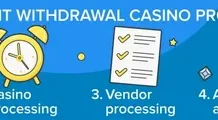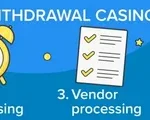The online gambling world offers a wide range of options, including non-GamStop sites that operate outside the UK’s self-exclusion scheme. While these sites may provide alternatives for some players, it’s crucial to approach them with caution and verify their legitimacy. This article outlines the essential steps to help you determine whether a non-GamStop site is trustworthy and reliable.
Understanding Non-GamStop Sites
Non-GamStop sites are online casinos and betting platforms that are not registered with the UK’s GamStop program. These sites typically hold licenses from jurisdictions outside the UK, allowing them to accept players from various countries, including the UK. However, this also means they are not subject to the same stringent regulations as UKGC-licensed operators.
Why Verify Legitimacy?
Verifying the legitimacy of a non-GamStop site is paramount to protect yourself from potential risks, such as:
- Fraudulent activities: Unlicensed or poorly regulated sites may engage in unfair practices, such as rigging games or refusing to pay out winnings.
- Data breaches: Inadequate security measures can expose your personal and financial information to hackers.
- Lack of recourse: If you encounter problems with an illegitimate site, you may have limited options for resolving disputes or seeking compensation.
Key Steps to Verify Legitimacy
Here’s a comprehensive guide to help you assess the trustworthiness of a non GamStop sites:
- Check Licensing Information:
- A valid license from a reputable regulatory body is the most crucial indicator of legitimacy.
- Look for licensing information on the site, usually found in the footer or “About Us” section.
- Common licensing jurisdictions for non-GamStop sites include:
- Malta Gaming Authority (MGA): Generally considered a reputable regulator with relatively strict standards.
- Curacao eGaming: A widely used but less stringent regulator. Exercise more caution with Curacao-licensed sites.
- Other jurisdictions: Research the specific regulator and its reputation if the site is licensed elsewhere.
- Verify the license: Don’t just take the site’s word for it. Visit the regulator’s website and confirm that the license is valid and active.
- Evaluate Reputation and History:
- Research the site’s reputation and history. Look for player reviews, feedback on online forums, and any reports of complaints or disputes.
- Consider the site’s age. Established sites with a positive track record are generally more trustworthy than new or unknown ones.
- Be wary of sites with a history of:
- Unpaid winnings
- Unresolved customer complaints
- Suspicious activity
- Assess Security Measures:
- Legitimate sites employ robust security measures to protect your data. Look for:
- SSL encryption: This technology encrypts data transmitted between your device and the site’s servers. Check for the padlock icon in your browser’s address bar.
- Firewalls: These systems protect the site’s servers from unauthorized access.
- Secure payment methods: Reputable payment providers (credit cards, e-wallets, cryptocurrencies) with their own security protocols.
- Legitimate sites employ robust security measures to protect your data. Look for:
- Examine Game Fairness:
- Ensure the site offers games from reputable software providers known for fair play.
- Look for certification from independent testing agencies (e.g., eCOGRA, iTech Labs, GLI) that verify the fairness of the Random Number Generators (RNGs) used in the games.
- Consider sites that offer provably fair games, especially for games like dice or crash, as this technology allows you to verify the fairness of each outcome.
- Check Terms and Conditions:
- Carefully review the site’s terms and conditions, paying close attention to:
- Bonus terms: Are the wagering requirements reasonable? Are there any hidden restrictions?
- Withdrawal policies: What are the withdrawal limits and processing times? Are there any fees?
- Dispute resolution: How does the site handle disputes? Is there a clear process for resolving complaints?
- Be wary of terms that are vague, ambiguous, or heavily favor the casino.
- Carefully review the site’s terms and conditions, paying close attention to:
- Test Customer Support:
- Reliable customer support is essential for addressing any issues or concerns.
- Test the site’s customer support by contacting them with questions before signing up.
- Check for:
- Availability: Is support available 24/7?
- Responsiveness: How quickly do they respond?
- Helpfulness: Are they able to answer your questions clearly and accurately?
- Communication channels: Does the site offer multiple contact methods (live chat, email, phone)?
- Look for Responsible Gambling Tools:
- While non-GamStop sites operate outside the UK scheme, legitimate operators should still offer tools to help you manage your gambling, such as:
- Deposit limits
- Loss limits
- Self-exclusion (from that specific site)
- Reality checks
- While non-GamStop sites operate outside the UK scheme, legitimate operators should still offer tools to help you manage your gambling, such as:
Conclusion
Verifying the legitimacy of a non-GamStop site requires careful research and due diligence. By following the steps outlined in this article, you can significantly reduce your risk of encountering fraudulent or unreliable operators and ensure a safer, more enjoyable online gambling experience.









